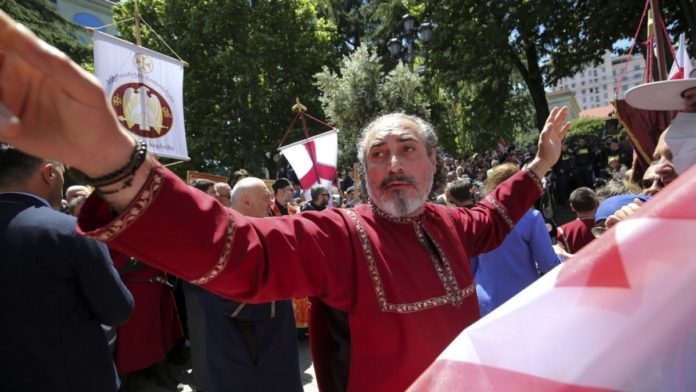The law, which includes bans on same-sex marriages, was approved by parliament before being opposed by pro-European President Salome Zourabichvili.
Georgia’s parliament speaker signed a controversial anti-LGBTQ+ rights bill on Thursday after President Salome Zourabichvili refused to endorse it, solidifying it into the country’s law.
The bill, which has been sharply criticised by human rights and LGBTQ+ groups, includes bans on same-sex marriages, adoptions by same-sex couples and limitations on the depiction of LGBTQ+ couples in the media.
It also bans gender-affirming care and changing gender designations in official documents — a move that activists say disproportionately impacts transgender people and is directly linked to anti-LGBTQ+ hate crimes in the country.
Parliament Speaker Shalva Papuashvili said in a social media post that the legislation was “based on common sense, historical experience and centuries-old Christian, Georgian and European values.”
The bill was first approved by lawmakers after being introduced by the ruling Georgian Dream party, who argued that the legislation protected traditional values in the staunchly Orthodox country.
Experts have suggested the law is an attempt to drum up popular support for the party before the country’s parliamentary elections on 26 October.
‘Laws like this are going to cause violence’
Zourabichvili, who is pro-European, has long been at odds with the governing party and was previously overridden by parliament when she vetoed the so-called “foreign influence” law, which requires media and nongovernmental organisations to register as “pursuing the interests of a foreign power” if they receive more than 20% of their funding from abroad.
Both laws are said to mimic legislation introduced in Russia used to marginalise vulnerable groups and suppress dissent.
Critics have said passing such laws jeopardises Georgia’s chances of joining the EU, a process Tbilisi formally applied for in 2022, but the bloc halted in response to the “foreign influence” law.
Brussels has also frozen financial support for the South Caucasus nation in response to the legislation, while the US has imposed sanctions on dozens of Georgian officials.
In Georgia, the LGBTQ+ community has faced demonstrations and violent outbursts even before the legislation was proposed, with hundreds of opponents of gay rights storming an LGBTQ+ festival in the country’s capital last year.
A day after parliament gave its final approval to the anti-LGBTQ+ bill, transgender actress and model Kesaria Avramidze was stabbed to death in her apartment in Tbilisi, an act that rights advocates have linked to the marginalisation of LGBTQ+ groups in the country.
“We have been saying all along, all these months, that laws like this are going to cause violence and are going to increase the number of people that are physically attacked,” Tamar Jakeli, the head of Tbilisi Pride, said.


